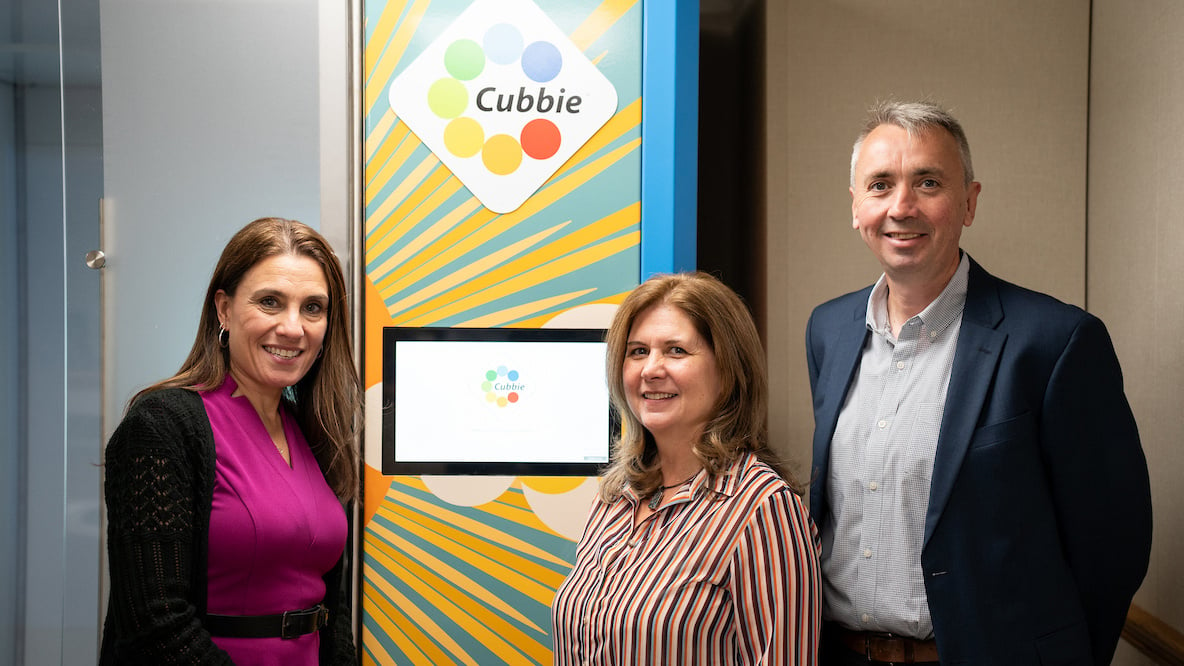
Jenelle Abnett, Tiffeny Atkins, and Jon McIntyre
Imagine having access to a tool that can reduce anxiety and stress in less than 10 minutes.
That’s the promise of a Cubbie, an immersive sensory regulation booth that can help individuals “get back to center through music, video, and lighting,” as explained by Dr. Jenelle Abnett, Neumann’s expert in autism and neurodiversity.
And Neumann has the first Cubbie in America.
It was installed in mid-November on the ground floor of Bachmann, directly across from the computer lab. At first glance, it looks like an oversized phone booth, but the interior is a high-tech mixture of a digital screen, audio feed, and comfortable seating to provide a sensory regulation experience.
According to Abnett, Cubbie was designed with autistic and neurodivergent people in mind, but anyone can benefit from it when feeling stressed, anxious, or even down and sluggish.
Dr. Tiffeny Atkins, a Neumann faculty member specializing in pediatrics and human development, explains that “The Cubbie experience can support student well-being by helping them manage the common pressures of college life, such as academics, athletics, performances, and social interactions.”
“Yes, it works for those with autism, attention-deficit disorder, depression and anxiety disorders, but it’s much broader,” says Abnett. “If a student is preparing for a high-stakes exam and taking tests causes distress, they can center themselves in the Cubbie before the exam.”
The Cubbie will be open to students, faculty and staff during the spring semester. Neumann is producing a video tutorial to explain how to use it effectively.
The long-term goal, however, is much more ambitious.
Abnett, assistant professor of special education, and Atkins, professor of physical therapy, are launching an independent research project on the effectiveness of a multi-sensory regulation space. They will be the principal investigators in a yearlong study.
The pair are collaborating with David and Jon McIntyre, Irish brothers who designed and launched Cubbie, to use the booth as the intervention tool for the research. For the McIntyres, both of whom have neurodiverse children, the project is more than just a business enterprise.
Neumann hopes to partner with 8-10 local school districts to install Cubbies during the 2025-26 academic year and collect data on students’ perceptions of their emotional well-being and educators’ reports on student focus and classroom disruptions.
Several schools without Cubbies would also participate in the study, acting as a control group.
For the schools, the benefits are clear. Sensory breaks are key in the routine of neurodivergent students, allowing them to regulate and return to their lessons with full concentration. Cubbie helps complete this process quickly and with little classroom disruption. In a study conducted in Ireland, Cubbie showed a 60% reduction in disruptions and a 90% increase in participation.
“The study hopes to show similar results for students here in America as it does in Ireland,” says Abnett. “If it does, schools could have a tool that would support inclusive education, increase students’ time on task, and decrease disruptive behaviors.”
Abnett notes that the Cubbie program can be personalized. “The company has a group of occupational therapists who are available to customize the experience for individual needs,” she explains. “The speed and tone of the music and video will be set to regulate each individual user.”
University Advancement is working to raise funds to support all aspects of the study: Cubbie costs, shipping and installation, and research expenditures.
For McIntyre, whose son is on the autism spectrum, the study and references from school personnel would help introduce Cubbie to the American market.
Cubbies are currently used at almost 300 sites in Ireland and the UK. “Children’s hospitals use them the most because of the innate high stress situations in those settings,” says McIntyre. “There are endless applications, but we decided to start here with education.”
He chose Neumann as Cubbie’s American partner because of the university’s close relationship with the CHOP Center for Autism Research and the Eagles Autism Foundation as well as the curricular focus on education, healthcare, criminal justice, and sport management.
“It just felt absolutely right,” he says.
In Europe, the company has worked with Trinity College in Dublin, Queens College in Belfast, and King’s College in London.
Schools interested in exploring participation in the study should contact Dr. Jenelle Abnett at abnettj@neumann.edu.
 CHALLENGE
CHALLENGE





